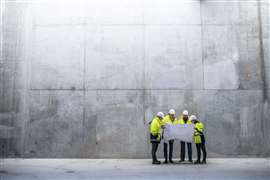Read this article in Français Deutsch Italiano Português Español
Will greener supply chains shape the future of the built environment?
06 May 2024
From the European Green Deal to the Paris Agreement, companies across all industries are under increasing amounts of pressure to become more sustainable – a goal that last year’s COP28 pact to “transition away from fossil fuels” will only intensify.

The built environment will fall under particular scrutiny, given that the construction and engineering sector (C&E) currently accounts for 40% of global energy consumption, according to the World Green Building Council. This could have an impact on future trade.
Nevertheless, transforming C&E supply chains could change the narrative, guaranteeing compliance whilst simultaneously restoring public reputation and trust.
Why start with supply chains?
The World Green Building Council has reported that 11% of global carbon emissions are produced by the materials and construction process.
As such, sustainable built-environment supply chains are a logical place to start when it comes to tackling climate-related concerns. Indeed, the entire pipeline – from supplier selection and materials distribution through to end product and waste disposal – can account for 90% of a company’s total greenhouse gas emissions, according to the United States Environmental Protection Agency. Any reductions in pollution produced throughout this process will thus be significant.
Compliance from councils
Aware of the positive changes that greener supply chains can have on the environment, many local authorities and councils looking at their own development partners and supply chains to transition to a greener economy. Indeed, the net zero targets the government has asked them to work towards require the careful selection of contractors who can demonstrate sufficient commitment to decarbonising their operational practices.
A 2023 report on identifying and promoting green growth opportunities published by the Local Government Association has revealed that over 300 councils have already declared a “climate emergency”, which means environmental factors will come to the fore in their procurement decisions.
This should be a wake-up call to construction companies, which must become greener to win contracts. The pressure to conform to green goals comes not only from the public sphere but also from the private sector, with private clients preferring to work with developers that lower the carbon footprint, according to Deloitte’s 2024 engineering and construction industry outlook.
Sustainable supply chains as a competitive advantage
Competitive public tender advantages and regulatory compliance aside, adhering more closely to environmental regulations will also allow construction companies to boost their reputation by giving them tangible evidence of doing something positive for the planet. According to a SmartestEnergy report, four in five people prefer providers with a positive approach to environmental sustainability, highlighting the extent to which green operations are now a major priority for a range of construction stakeholders.

A Deloitte article titled Customers’ green focus is read loud and clear by the construction industry published in 2023 revealed that 73% of construction and engineering clients – public and private – now identify the sustainable use of materials and resources as a top priority. Likewise, 63% are calling for focus on reduced energy consumption, with an additional 60% calling for better waste reduction and 17% asking companies to prioritise low-carbon energy sourcing.
Sustainable supply chains could become a decisive factor for employees too – particularly among the younger generations. For example, a study conducted by digital product studio PLAY, which asked GenZ employers about their views on sustainability initiatives in business, revealed that two-thirds of young people feel it’s important for the company they work for to be committed to acting sustainably.
Planet-friendly progress for all
Ultimately, focusing on greener supply chains is all about increased accountability, whether it’s to your team members, clients and local authorities if you’re a contractor or to the public and wider government if you work for a council or public organisation.
Whilst responsible supply chain practices in construction and engineering can be difficult to determine without external expert help, the results for people, the planet and private business alike remain unrefuted – making the extra time and money invested worthwhile.
About the author
Robbie Blackhurst is the founder of Black Capital Group (BCG) and the Procure Partnerships Framework. The framework ensures contractors do not inflate their costs when delivering major construction projects for local government procurement contracts.
STAY CONNECTED



Receive the information you need when you need it through our world-leading magazines, newsletters and daily briefings.
CONNECT WITH THE TEAM











